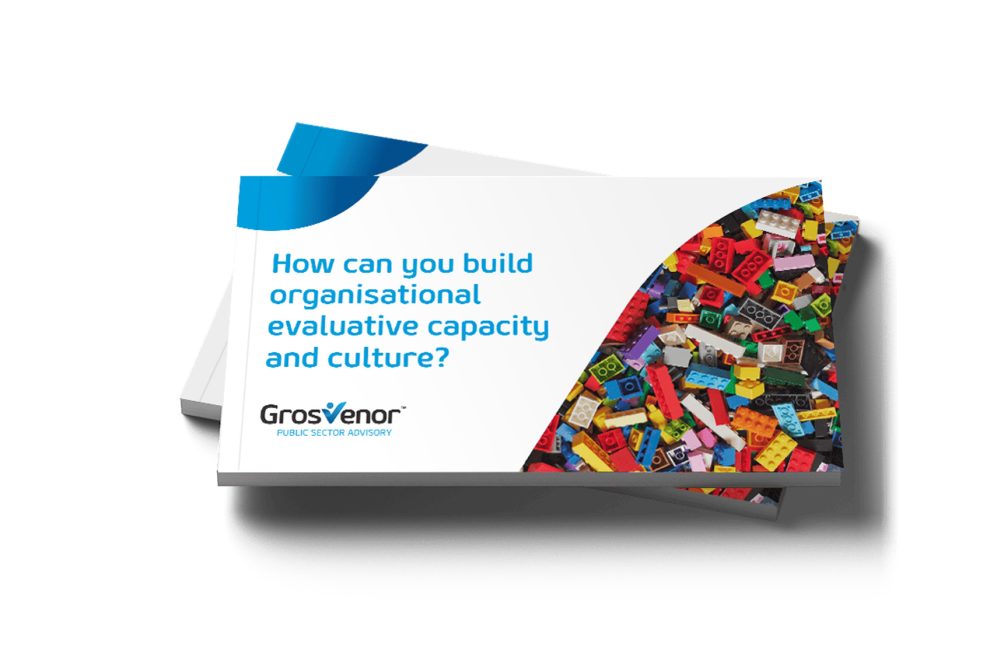Evaluation Capacity and Culture

Understanding the evaluation maturity of your organisation
The APS reform agenda has reiterated the importance of embedding a culture of evaluation in our government agencies – while this presents an exciting opportunity for evaluators, we all know it’s not as simple as saying ‘Yes, let’s now have a culture of evaluation!’.
Evaluative culture definition
In 2008, John Mayne defined evaluative culture as “an organizational culture that deliberately seeks out information on its performance in order to use that information to learn how to better manage and deliver its programmes and services, and thereby improve its performance.”
While this definition has been around for some time, we feel it provides a clear and succinct explanation of the evaluative culture, which ties in nicely with Priority Four of the APS Reform Agenda.
Priority Four of the APS Reform Agenda
An APS that has the capability to do its job well – The APS builds the capability of its staff to create a skilled and confident workforce, and a robust and trusted institution that delivers modern policy and service solutions for decades to come.
Culture of evaluation
A culture of evaluation is all about shaping the way an organisation thinks and talks about evaluation as a key component to improvement and innovation. This sounds great in theory – particularly for evaluators who understand the impact of their work, but how do you bring everyone else on the journey?
Any deliberate change in culture does not happen by accident. It relies on collective willingness to explicitly connect the values, behaviours, capabilities and practices of the organisation to achieve the desired shift in culture. So, when an objective is set down for us to ‘embed a culture of evaluation’, we must first look to our organisational values, behaviours, capabilities and practices to identify what we must change in order to achieve the culture we are aiming for.
When it comes to a culture that values evaluation, we should start by honestly examining our current behaviours and practices around decision-making, learning and improvement.
Questions to ask
‘Are we an organisation that seeks to understand lessons and then manages those lessons to improve our policies, services and programs, or do we have a tendency to tell the good news story?’
‘Are we an organisation that values evidence-based approaches to decision-making, or are we reactive to the agendas and motivations of individual decision-makers?’
‘Are we an organisation that has a cohesive leadership cohort unified around common goals, or do we operate in siloes and fight patch protection battles?’
‘Are we an organisation that promotes information sharing, integrity and transparency, or do we operate in a needs-to-know basis?’
Evaluation maturity
Instead of evaluation being in the background, for mature organisations it is at the forefront of program, service and policy design and monitoring. Key to achieving this level of maturity is building the evaluation capability of staff as well as promoting the practice of good evaluation. Having a regular, reinforced narrative around the importance of evaluation in demonstrating that policies, programs and services are robust, and can be trusted is central to a culture that is future-facing and deliberately developmental.
Grosvenor’s Evaluation Maturity Model
Our evaluation maturity model has 10 segments we believe each organisation needs to focus on to uplift overall evaluation capability and maturity. The model can be used as a guide in identifying the priority areas to focus on in building evaluation culture and maturity.
Download the How can you build organisational evaluative capacity and culture? where you will find the Grosvenor Evaluation Maturity Model and our free checklist to assessing evaluation maturity.
Want to know more about culture, capability and evaluation? Contact our Evaluation Experts hello@grosvenor.com.au







 We are all about sharing our expertise to help you and your organisation be the best it can be.
We are all about sharing our expertise to help you and your organisation be the best it can be.